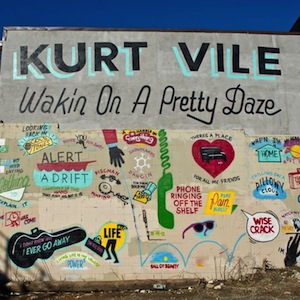A man out of time, Kurt Vile is a songwriter in a classic mould. Each release improving on the last, 2008’s Constant Hitmaker and 2009’s Matador debut Childish Prodigy served to establish two KV constants: a prolific, self aware mythmaker of some confidence, and a devoted student of decades of rock, folk, and noise (a cover of Dim Stars’ ‘Monkey’? What a dweeb.) But after opening himself up on the excellent Smoke Ring For My Halo, there’s something amiss on Wakin On A Pretty Daze – he sounds aloof and indirect, as if a few too many diary entries left him exposed.
On the early records, Kurt’s wandering mind would manifest itself in 90-second sketches of sound, a looped riff and a loose verse later re-used. On Pretty Daze, his mind wanders, but only within the strict confines of a song. Where Smoke Ring put Vile’s voice front and centre, here he often trails off where you might expect a chorus, and instrumentation takes precedence with keys warbling in the background. Guitar solos appear often, and at length.
At 69 minutes, it’s expansive and certainly his most ambitious recording yet. The lengthy, cyclical arrangements share more in common with his Philly brothers in arms The War on Drugs than they do his previous roots and rock touchstones. But unlike his former band’s rambling pilgrimages to where’er, Pretty Daze can sometimes feel on rails, stuck in one direction until there’s no track left. This locked-in psychedelia also brings to mind one of producer John Angello’s more high profile gigs: Bob Dylan’s ‘Series of Dreams’, his 1989 surrealist meditation on repetition ("all I seemed to be doing was climb".)
This kind of running on the spot serves at its best on a song like the not-quite title track ‘Wakin On A Pretty Day’, a beautiful, bucolic front porch strummer, opening the record with as much intent stated as relaxed indifference. The song’s claims of living "along a straight line" literalise the album’s relationship with forward momentum better than any lowly rock critic might.
He follows through with some rare candour on ‘Was All Talk’. Warped acoustic guitars and a drum machine back him up for eight minutes, which feels like the Childish Prodigy highlight ‘Freak Train’ all grown up; swapping stare-downs with the night weirdos for putting in the hours and proving oneself, a former forklift driver’s ‘fuck you’ to all career counsellors.
This dogged determinism can make the album’s few deviations from form feel like radical change ups; the keyboard shuffle at the end of ‘Air Bud’ is a welcome break from plainly functional riffing, and the halfway-point breakdowns on ‘Girl Called Alex’ and ‘Pure Pain’ make for glorious breathing space, owing some debt to Angello’s work on the last two Sonic Youth records.
When he lets his guard down on the almost-solo acoustic ‘Too Hard’, it is demonstrative of the way in which the album will demand repeat listens to take apart the initial obfuscation; at first over-long and meandering, the minimal accompaniment keeps the spotlight on Vile’s heartfelt declarations for his young daughter ("I promise to do my very best for you"), and it’s here that Pretty Daze might start to let you in.
Yet the lack of immediacy isn’t Vile’s biggest problem here: it might seem trivial, but Wakin On A Pretty Daze is his first release that doesn’t improve upon his last. Rather like Bob Dylan endlessly climbing in one of his dreams, Kurt Vile remains stationary.


